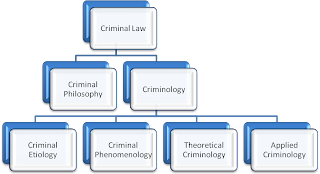Criminology is defined as a multidisciplinary and interdisciplinary science. Criminology as an empiric science (uses scientific experience) studies natural and social facts about the delinquency, delinquents, victims, social environment and all forms of crime. The term "criminology" derives from Latin word "crimen" which means crime or accusation and Greek word "logos" that means science or study. Criminology is an independent and autonomous science and academic discipline. There are some theorists that are claiming that criminology is only part of behavioral sciences, but that isn't correct. Criminology until it was defined as an independent and autonomous science and academic study were a part of philosophy. Later, the study of criminology was adopted by the scientific discipline of criminal law as a secondary academic discipline to set answers about a crime causation and other questions.
Black's law dictionary defines the crime as "an act committed or omitted in violation of law forbidding or commanding it and for which punishment is imposed upon conviction."
Other definitions describe the crime as an unlawful activity.
The word "criminal" by Blacks's law definition is "that which pertains to or is connected with the law of crimes, or administration of penal justice, or, which relates to or has the character of crime. Criminal is also a person who has committed a crime or the one who is guilty of a felony or misdemeanor."
How to define criminology
Black's law dictionary defines the crime as "an act committed or omitted in violation of law forbidding or commanding it and for which punishment is imposed upon conviction."
Other definitions describe the crime as an unlawful activity.
The word "criminal" by Blacks's law definition is "that which pertains to or is connected with the law of crimes, or administration of penal justice, or, which relates to or has the character of crime. Criminal is also a person who has committed a crime or the one who is guilty of a felony or misdemeanor."
How to define criminology
1. etiology and
2. phenomenology.
Etiology is a part of criminology that researches possible causes of crime (crime causation), while phenomenology researches all forms (types) of crime.
Criminology can be divided into:
1. Theoretical criminology (criminal psychology, criminal anthropology, criminal sociology, criminal politics, prophylactic criminology, criminal psychiatry and penology).
2. Applied criminology or pragmatic criminology (criminal politics, prophylactic criminology, criminal investigation, criminalistics).
3. Criminal etiology is a crime causation study.
4. Criminal phenomenology is the study about types of crimes such as sexual crimes, property crimes, etc.
Theoretical criminology researches methods and objects of criminological research.
Criminology doesn't have own methods, but uses scientific methods of other sciences. It is a quite rare phenomenon that any science has own methods of research except few of them like a psychology (method of introspection) or mathematics (calculating). Criminology's methods are either borrowed or adapted to a specific object of research (crime, victim, criminal, asocial behaviors, macro and micro social units).
Methods of criminology are:
1. Analysis
2. Synthesis
3. Comparative method
4. Statistical method
5. Historical method
6. Experiment
7. Psychological method
8. Clinical method
Objects of a research in criminology are delinquencies, delinquents, victims and the crime in general sense.
Criminology disciplines for etiological and phenomenological study of delinquency
Criminology disciplines for etiological and phenomenological study of delinquency
There are differences in theoretical approaches when defining criminology, and they usually are caused by differences between two different legal system: Continental Law and Common Law. Common Law is a legal practice characteristic of countries like United States of America, Canada, Australia, New Zealand, Great Britain and most of her former colonies, while Continental Law is a characteristic of all other European countries and theirs former colonies.
Criminalistics in Continental Law system is the criminalistic tactic, technique, methodology and practice of finding and comprehending criminals or discovering, researching crimes and collecting evidence, i.e. crime prevention and repression, while in the Common Law, it is only a part of it or just that what is considered to be a criminalistic technique in the Continental Law system. The term criminalistics ( only in Eng.) was used for a first time in U.S.A. by Macmillan in 1948. Both criminal investigation and criminalistics were genuinely founded by the Austrian judge investigator Hans Gross 1894. when he published his book "The manual for judge investigators."
Hans Gross was the first one who defined the forensic science ("criminal investigation and criminalistics") by setting questions, which should be answered by this scientific discipline.
There are seven questions, which need to be answered when investigating the crime:1. What? (Crime)
2. Who? (Criminal)
3. When? (Time of the crime)
4. How? ( How the crime is committed)
5. Where? ( Crime scene)
6. With what? ( Weapon)
7. Why? (Motive)
There are seven questions, which need to be answered when investigating the crime:1. What? (Crime)
2. Who? (Criminal)
3. When? (Time of the crime)
4. How? ( How the crime is committed)
5. Where? ( Crime scene)
6. With what? ( Weapon)
7. Why? (Motive)





